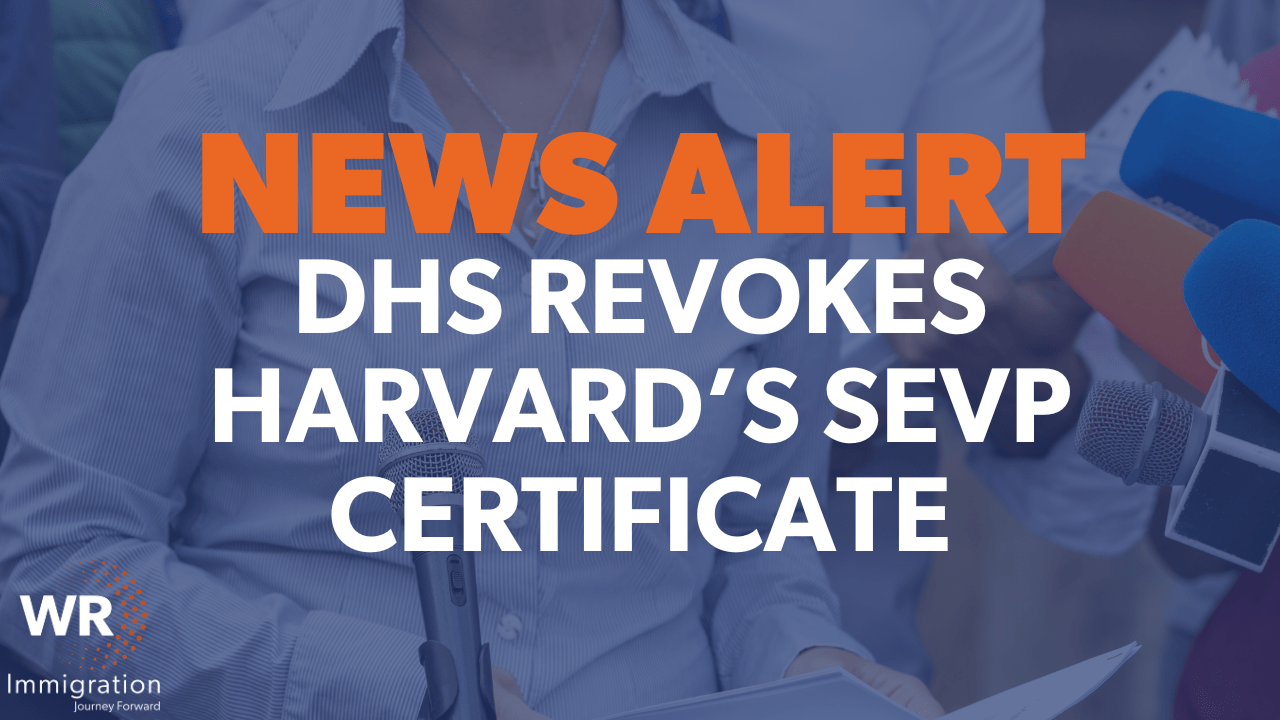In a significant and unprecedented move, the U.S. Department of Homeland Security (DHS) on May 22, 2025 revoked Harvard University’s certification under the Student and Exchange Visitor Program (SEVP), effective immediately. The decision bars Harvard from enrolling or granting practical training to international students and scholars on F or J visas for the 2025–2026 academic year. Existing international students on these visas must transfer to another SEVP-certified institution to maintain their legal nonimmigrant status. Such a transfer could negatively impact students’ Optional Practical Training.
On May 23, 2025, Harvard University filed a Motion for Temporary Restraining Order which was granted by the court.
DHS Cites Noncompliance and Campus Environment Concerns
According to a formal letter sent by DHS, the revocation stems from Harvard’s alleged failure to meet multiple SEVP compliance requirements, including timely responses to federal records requests. The agency states that Harvard repeatedly failed to provide adequate documentation regarding international students—particularly disciplinary records and information relating to student conduct that could potentially affect admissibility or removability under U.S. immigration law.
In addition to these compliance concerns, DHS raised broader allegations regarding the campus environment. The letter accuses Harvard of maintaining a setting that is “hostile to Jewish students,” of promoting “pro-Hamas sympathies,” and of enforcing what DHS described as “racist” diversity, equity, and inclusion (DEI) policies. DHS characterized these conditions as contributing factors in the decision to revoke SEVP certification, arguing that universities must ensure safe and lawful learning environments in order to retain the privilege of enrolling foreign nationals.
Impacts for Students and the University
The immediate consequence of this action is that no international students can begin studies at Harvard under F or J visa classifications for the upcoming academic year. More urgently, current international students enrolled under these statuses will need to transfer to another SEVP-certified school to maintain their legal immigration status. The logistical and emotional challenges this poses for students cannot be overstated.
The letter also warns that any attempt by Harvard to provide materially false or misleading information in response to DHS’s demands could result in criminal prosecution under federal law. Additional civil or administrative penalties may also apply.
Conditions for Reinstatement
DHS has provided Harvard with a 72-hour deadline to submit a comprehensive response to an extensive list of document requests. These include:
- Records of illegal, dangerous, violent, or threatening behavior involving nonimmigrant students over the past five years.
- Records of any deprivation of rights of classmates or university personnel by nonimmigrant students.
- All disciplinary records of nonimmigrant students over the same period.
- Audio or video footage of protest activity involving nonimmigrant students on campus within the last five years.
Failure to comply fully within the given timeframe may eliminate Harvard’s opportunity to reinstate its SEVP certification before the upcoming academic year begins.
Harvard Files for Emergency Legal Relief
In response to DHS’s action, Harvard has filed a motion for a Temporary Restraining Order (TRO) in the U.S. District Court for the District of Massachusetts. The university argues that the revocation is legally flawed and unconstitutional on several grounds. Specifically, Harvard claims that the decision was retaliatory, infringes on First Amendment protections by discriminating based on viewpoint, imposes unconstitutional conditions, and violates both the Administrative Procedure Act and the Fifth Amendment’s guarantee of procedural due process.
Harvard’s legal team emphasizes the immediate and irreparable harm caused by the revocation, noting that over 7,000 F-1 and J-1 visa holders—along with more than 300 dependents—now face disruptions to their legal status, academic progress, and ongoing research and professional training. The university also highlights the broader institutional damage to summer and fall academic programming, labs, clinics, and course offerings that depend on international student participation.
The TRO request seeks to halt the implementation and enforcement of DHS’s revocation while the case is reviewed. Harvard argues that it is likely to prevail on the merits and that the public interest supports immediate judicial intervention.
A Broader Message to Higher Education
This action represents a sharp escalation in federal oversight of university SEVP compliance and serves as a warning to other institutions. The DHS letter makes clear that under the current administration, the privilege of enrolling international students will be closely tied to institutions’ adherence to reporting obligations and federal expectations regarding campus safety and conduct.
As this situation develops, international students, legal advisors, and higher education institutions alike will be watching closely. The outcome could reshape the regulatory landscape for foreign student enrollment across the U.S.


